|
|
|
Sort Order |
|
|
|
Items / Page
|
|
|
|
|
|
|
| Srl | Item |
| 1 |
ID:
082162
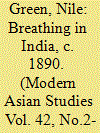

|
|
|
|
|
| Publication |
2008.
|
| Summary/Abstract |
This essay examines a series of 'Hindustani' meditation manuals from the high colonial period against a sample of etiquette and medicinal works from the same era. In doing so, the essay has two principal aims, one specific to the Indian past and one pertaining to more general historical enquiry. The first aim is to subvert a longstanding trend in the 'history' of religions which has understood meditational practices through a paradigm of the mystical and transcendent. In its place, the essay examines such practices-and in particular their written, and printed, formulation-within the ideological and technological contexts in which they were written. In short, meditation is historicised, and its 'Hindu' and 'Muslim' expressions, compared in the process. The second aim is more ambitious: to test the limits of historical knowledge by asking whether it is possible to recount a history of breathing. In reassembling a political economy of respiration from a range of colonial writings, the essay thus hopes to form a listening device for the intimate rhythms of corporeal history. In doing so, it may suggest ways to recount a connected and necessarily political history of the body, the spirit and the world
|
|
|
|
|
|
|
|
|
|
|
|
|
|
|
|
| 2 |
ID:
082165
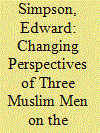

|
|
|
|
|
| Publication |
2008.
|
| Summary/Abstract |
In many religious traditions, those who mediate relations between men and gods are often the focus of controversy and moral ambiguity. The ethnography in this paper outlines a number of perspectives on the role of such intermediaries (here 'saints') in Muslim society in western India. In the South Asian literature, historians have provided a thorough treatment of the doctrinal history and content of these debates. However, very little attention has been paid to how living individuals interpret and rehearse these debates in practice. The examination of the changing perspectives of three Muslim men on the question of saint worship over a 10 year period reveals the following. First, an individual's relationship with 'saints' is often determined primarily by social context rather than simply by doctrinal allegiance or the compulsions of particular 'beliefs'. Second, discourses of religious reform are also powerful social objects that can be used as political instruments for purposes other than simply refining the religious practices of a community. Finally, many commonplace assumptions in the literature-notably on the nature of belief and the significance of doctrinal divisions among Muslims-do not withstand ethnographic scrutiny.
|
|
|
|
|
|
|
|
|
|
|
|
|
|
|
|
| 3 |
ID:
082161
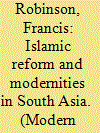

|
|
|
|
|
| Publication |
2008.
|
| Summary/Abstract |
From the beginning of the Islamic era, Muslim societies have experienced periods of renewal (tajdid). Since the eighteenth century, Muslim societies across the world have been subject to a prolonged and increasingly deeply felt process of renewal. This has been expressed in different ways in different contexts. Amongst political elites with immediate concerns to answer the challenges of the West, it has meant attempts to reshape Islamic knowledge and institutions in the light of Western models, a process described as Islamic modernism. Amongst 'ulama and sufis, whose social base might lie in urban, commercial or tribal communities, it has meant 'the reorganisation of communities . . . [or] the reform of individual behavior in terms of fundamental religious principles', a development known as reformism. These processes have been expressed in movements as different as the Iranian constitutional revolution, the jihads of West Africa, and the great drives to spread reformed Islamic knowledge in India and Indonesia. In the second half of the twentieth century, the process of renewal mutated to develop a new strand, which claimed that revelation had the right to control all human experiences and that state power must be sought to achieve this end. This is known to many as Islamic fundamentalism, but is usually better understood as Islamism. For the majority of Muslims today, Islamic renewal in some shape or other has helped to mould the inner and outer realities of their lives
|
|
|
|
|
|
|
|
|
|
|
|
|
|
|
|
| 4 |
ID:
082160


|
|
|
|
|
| Publication |
2008.
|
| Summary/Abstract |
ethnographic perspectives against which to test claims about processes of reform and about trends such as 'Islamism' and 'global Islam'. The very use of terminology and categories is itself fraught with the dangers of bringing together what is actually substantially different under the same banner. While our authors have often found it necessary, perhaps for the sake of comparison or to help orient readers, to take on terms such as 'reformist' or 'Islamist', they are not using these as terms which imply identity-or even connection-between the groups so named, nor are they reifying such categories. In using such terms as shorthand to help identify specific projects, we are following broad definitions here in which 'Islamic modernism' refers to projects of change aiming to re-order Muslims' lifeworlds and institutional structures in dialogue with those produced under Western modernity; 'reformism' refers to projects whose specific focus is the bringing into line of religious beliefs and practices with the core foundations of Islam, by avoiding and purging out innovation, accretion and the intrusion of 'local custom'; and where 'Islamism' is a stronger position, which insists upon Islam as the heart of all institutions, practice and subjectivity-a privileging of Islam as the frame of reference by which to negotiate every issue of life; 'orthodoxy' is used according to its specific meaning in contexts in which individual authors work; the term may in some ethnographic locales refer to the orthodoxy of Islamist reform, while in others it is used to disparage those who do not heed the call for renewal and reform. 'Reformism' is particularly troublesome as a term, in that it covers broad trends stretching back at least 100 years, and encompassing a variety of positions which lay more or less stress upon specific aspects of processes of renewal; still, it is useful as a term in helping us to insist upon recognition of the differences between such projects and such contemporary obsessions as 'political Islam', 'Islamic fundamentalism' and so on. Authors here are generally following local usage in the ways in which they describe the movements discussed (thus, Kerala's Mujahid movement claims itself as part of a broader Islahi-renewal-trend and is identified here as 'reformist'). But while broad terms are used, what the papers are actually involved in doing is addressing the issues of how specific groups deal with particular concerns. Thus, not, 'What do reformists think about secular education?', but, 'What do Kerala's Mujahids in the 2000s think? How has this shifted from the position taken in the 1940s? How does it differ from the contemporary position of opposing groups? And how is it informed by the wider socio-political climate of Kerala?' The papers here powerfully demonstrate the historical and geographical specificity of reform projects, whereas discourse structured through popular mainstream perspectives (such as 'clash of civilizations') ignores such embeddedness
|
|
|
|
|
|
|
|
|
|
|
|
|
|
|
|
| 5 |
ID:
082163
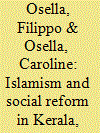

|
|
|
|
|
| Publication |
2008.
|
| Summary/Abstract |
This paper critiques ethnographic tendencies to idealise and celebrate sufi 'traditionalism' as authentically South Asian. We perceive strong academic trends of frank distaste for reformism, which is then inaccurately-and dangerously buttressing Hindutva rhetoric-branded as going against the grain of South Asian society. This often goes along with (inaccurate) branding of all reformism as 'foreign inspired' or wah'habi. Kerala's Mujahids (Kerala Naduvathul Mujahideen [KNM]) are clearly part of universalistic trends and shared Islamic impulses towards purification. We acknowledge the importance to KNM of longstanding links to the Arab world, contemporary links to the Gulf, wider currents of Islamic reform (both global and Indian), while also showing how reformism has been producing itself locally since the mid-19th century. Reformist enthusiasm is part of Kerala-wide patterns discernable across all religious communities: 1920s and 1930s agitations for a break from the 19th century past; 1950s post-independence social activism; post 1980s religious revivalism. Kerala's Muslims (like Kerala Hindus and Christians) associate religious reformism with: a self-consciously 'modern' outlook; the promotion of education; rallying of support from the middle classes. There is a concomitant contemporary association of orthoprax traditionalism with 'backward', superstitious and un-modern practices, troped as being located in rural and low-status locations.
|
|
|
|
|
|
|
|
|
|
|
|
|
|
|
|
| 6 |
ID:
082169
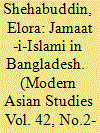

|
|
|
|
|
| Publication |
2008.
|
| Summary/Abstract |
This article argues that leaders of the Jamaat-i-Islami in Bangladesh regularly invoke women's privileged status as mothers to counter the claims of the largely secularist non-governmental organizations operating in the country today that Islam has been harmful to women and that the only route to progress is to discard the shackles of religion and tradition. The current Jamaat rhetoric marks a significant change from the original Jamaat position-elaborated by the party's founder Abul Ala Maududi-that women's divinely ordained place is in the home. Now, several decades later, Jamaat leaders in Bangladesh still enjoin women to fulfil domestic obligations; however, they also go to great lengths to highlight Islam's recognition of women as 'individuals' with 'individual' responsibilities to God and Islam as well as Islam's support for women's right to study, work and vote. I contend that the Jamaat in Bangladesh has been prompted to undertake these recent modifications by specific developments in local social and political contexts, specifically the twin pressures on the Jamaat of operating in a functioning, if often imperfect, democratic polity; and of competing with more secular organizations for the hearts, minds and votes of impoverished women
|
|
|
|
|
|
|
|
|
|
|
|
|
|
|
|
| 7 |
ID:
082164


|
|
|
|
|
| Publication |
2008.
|
| Summary/Abstract |
In this paper I argue that the manner in which piety is perceived and propagated among Muslims in Sri Lanka must be understood as located within the context of ethnic conflict and the polarization between ethnic groups that occurred in its wake. I explore the work of one Muslim women's da'wa (preaching) group-Al Muslimaat-that pioneered the process of making piety popular among lower-middle and middle-income Muslim women in a semi-urban Colombo neighbourhood. Looking at the group's activities and specifically through analyses of the bayan or lay sermons delivered by their most charismatic member, I look at the nature of the pious practice that is preached. I argue that in making a self-consciously pious Muslim female subject, Al Muslimaat bayans are affecting ideas of masculinity and femininity among the suburban Muslims with whom they work, and recasting Muslimness in a manner exclusive of ethnic others. I argue also that by marginalizing the kafir in propagating the new Muslim, Al Muslimaat and the greater piety movement in Sri Lanka is mirroring the particular incommensurable identities already espoused by the violently strident Sinhala and Tamil nationalisms in the country.
|
|
|
|
|
|
|
|
|
|
|
|
|
|
|
|
| 8 |
ID:
082168


|
|
|
|
|
| Publication |
2008.
|
| Summary/Abstract |
While much has been written about resurgent Islamic movements in recent decades, the proliferation of religious reading circles has received little attention. Few studies delineate the specifics of audience engagement with authoritative Islamic texts on the ground. This paper is a small attempt at such an inquiry in the context of Bangladesh. It investigates a particular Islamist Qur'anic study session conducted in Dhaka in 2003. Such reading sessions are routinely conducted within Bangladesh Islamic Chatri Sangstha (BICSa), the leading Islamic organization of women students in Bangladesh. I suggest that BICSa reading sessions embody spaces of both deliberation and discipline. In analysing a group discussion of a set of Qur'anic verses widely assigned for study within BICSa, particularly in relation to the central Islamist notion of 'belief', this paper argues that reading circles play a primary role in the production of a uniquely disciplined and devout, yet modern Islamist subjectivity in Bangladesh. A study circle familiarizes a lay Bangladeshi with specific kinds of religious literature and teaches them to understand and shape contemporary realities via scriptural injunctions. However, this inculcation process is not linear: The mastery of the Qur'anic literature enables both devotion to and contestation of BICSa precepts
|
|
|
|
|
|
|
|
|
|
|
|
|
|
|
|
| 9 |
ID:
082167
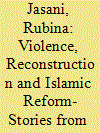

|
|
|
|
|
| Publication |
2008.
|
| Summary/Abstract |
This paper is a critique of popular and academic assumptions about the Muslim 'community' and Islamist organizations, especially in the context of displacement and reconstruction after the 2002 riots in Ahmedabad, western India. It explores the internal politics of Jamaat-led organizations and the engagement of survivors with ideas of reform and piety. Contesting contemporary understandings of reformist Jamaats, I argue that the growing influence of the latter organizations had little co-relation with their resettlement plans and policies. The reconstruction patterns were more closely linked to the history of labour migration to the city, and the subsequent movement of violence-affected people from the mill areas to larger Muslim ghettoes. My ethnography shows how the survivors strategically engaged with reform initiatives and negotiated with local Islamist organizations for 'safe housing'. By illustrating certain ambiguities within the everyday practices of Islam, my paper also problematizes notions of 'piety' and 'agency', primarily after people's experiences of communal violence.
|
|
|
|
|
|
|
|
|
|
|
|
|
|
|
|
| 10 |
ID:
082166


|
|
|
|
|
| Publication |
2008.
|
| Summary/Abstract |
This paper explores the responses of women living in a small town in the Chitral region of northern Pakistan to the Islamizing policies of the Muttahida Majlis-e Amal, a coalition of Islamist parties elected to provincial government in the North West Frontier Province in October 2002. Its focus is on women in the region who vocally and publicly criticize Chitral's politically active madrasa-educated 'men of piety'. Documenting the ways in which these women and the region's 'men of piety' debate with one another on matters concerning personal morality, comportment and self-presentation illuminates dimensions of small-town Muslim life that are rarely considered important in Pakistan's North West Frontier Province. In particular, by exploring these complex and multi-dimensional debates, I seek to emphasize the inherently unfinished nature of Chitralis' responses to ongoing Islamizing processes, a growing and pervasive sense of disenchantment amongst many of the region's Muslims with the authenticity of public expressions of personal piety, and, in this context, the continuing emergence of new ways of being Muslim, modes of self-presentation and categories of Islamic public opinion forming figures.
|
|
|
|
|
|
|
|
|
|
|
|
|
|
|
|
|
|
|
|
|